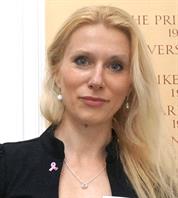RSA Connector Alexandra Krawiec reflects on the final of three lectures she is organised in Poznań, Poland. Three talks on three different topics with respected scientific experts designed to provide an opportunity for the public to listen first-hand to the facts in a time of misinformation and widespread dissemination of confusing messages.
Questions about the Future lecuture series:
The use of language was never neutral to our thoughts and behaviour. Our intellect and our emotions are intrinsically connected with language. Today, with the development of cognitive science, using state-of the art neuroimaging techniques, we can tell with confidence that language, more than any other characteristic of our species, allows us to make sense of reality and contributes to the development of human culture. The implications of the interconnectivity between thought, language, emotion, and behaviour have been studied from multiple perspectives. From the Sapir-Whorf hypothesis of linguistic relativity implying that language directly impacts our cognition of the world, to Noam Chomsky’s universal grammar theory, and the contradictory functional theory of language development proposed by Michael Tomasello, to Steven Pinker’s arguments for evolutionary importance of language, it is hard to disagree that language plays a fundamental role in shaping our perception, how we see ourselves and the world.
During the last lecture in the “Questions about the Future” series (supported by RSA Fellowship), professor Katarzyna Dziubalska-Kołaczyk, an internationally renowned language expert from University of Adam Mickiewicz in Poznan, Poland, specialising in phonology, presented a talk focusing on language reflecting prejudice against women, especially women in academia. Having a long experience with higher education institutions, as one of still relatively few female deans and directors of departments, professor Dziubalska-Kołaczyk made a point that language can introduce confusion or explicitly reveal some conscious and unconscious biases against women. Even though professor Dziubaska-Kołaczyk specialises in the English language, for the purpose of the lecture, she prepared examples of sexist language use in Polish. Unlike English, Polish is an inflected language – nouns have gender. This, among other characteristics, enables the study of cultural attitudes by analysing the use of language in a given context and in relation to social groups, for example women. For example, while in English we might debate over whether the term ‘policeman’, ‘policewoman’, or ‘police officer’ is most appropriate, in inflected languages such as Polish, this debate extends to virtually every profession and title. The presentation referenced several scientific studies, and was richly illustrated with examples of language use originating in Dziubalska-Kołaczyk’s personal experience as female academic. Some of the rather concerning examples of biased language use were wittily commented on by the speaker, which was met with heated enthusiasm from the audience. The talk was followed by many questions, and the discussion continued during the reception.
As with all previous lectures in this series (on climate change and on the future of AI) I began proceedings with a presentation about the RSA. I included relevant information about the RSA’s past and current initiatives, both were met with a lot of interest. These projects were also mentioned during my own invited lecture organised within the framework of the annually held event “International Brain Awareness Week” at the Polish Academy of Science (IBCH PAS) in Poznan.
In this last report I would like to express my gratitude to the RSA Global Team for all their support right from the beginning of the project. I am deeply convinced that initiatives like this one play an invaluable role in creating public discourse important to local communities, and reverberate onto the broader national and international forums.
As it has been endlessly repeated in recent years, our times are challenging in an unprecedented way. We are facing climate change, a new technological revolution, and (unlike the previous generations) today we make use of language through powerful digital communication tools. These tools, to some extent, contribute to the current global crisis of trust, and to the presence of various social anxieties. It is hard to overestimate the importance of RSA projects when fear, mistrust, and uncertainty create divides, and permeate our societies attempting coup d'état on our hopes and liberties. In our complex and overwhelming reality, we may tend to think that as individuals we are powerless and our attempts to change anything are ex ante doomed to fail. But, on the other hand, bearing in mind history and trailblazers such as individual people within the suffragettes movements, or the multiple modern examples of people transforming reality by raising social awareness and promoting e.g. sustainable management of resources, we must not forget that small steps can make big difference. Margaret Mead reportedly said: "Never doubt that a thoughtful, committed individual can change the world. Indeed, it's the only thing that ever has."
In the light of the current unstable socio-economic climate, collaborative initiatives like these supported by the RSA Fellowship are of unspoken value to many of us. They contribute to better understanding within local communities, and to the narrowing of culture gaps in multi-cultural contexts. I feel that activities undertaken by the RSA’s Global team also enable the exchange of ideas, and provide a platform for international collaboration. By highlighting the value of joint effort, initiatives like this one not only encourage an open mindset, but touch the lives of many, and promote the ideas of the 21st century enlightenment.
Alexandra Kraweic is the RSA’s Connector in Poland and is currently hosting a series of lectures supported by the RSA Fellowship.
Related articles
-
Counting the cost of bowling alone
Andy Haldane
In his 2025 CEO Lecture, Andy Haldane addresses how the ever-increasing cross-border flows of goods, people and information affect widening divisions and accelerate the depletion of social capital.
-
Prosperous Places: creating thriving communities
Tom Stratton
With regional growth at the top of the agenda, it is vital that we create thriving communities across economic, social and natural perspectives. Prosperous Places is a suite of interventions aimed at responding to the unique ambitions and challenges of places.
-
Pride interview: Felipe Tozzato
Deborah Ajia
The commercial photographer and RSA Fellow explains what Pride means to him, the importance of courage, making friends through rugby and why being gay is his superpower.




Be the first to write a comment
Comments
Please login to post a comment or reply
Don't have an account? Click here to register.